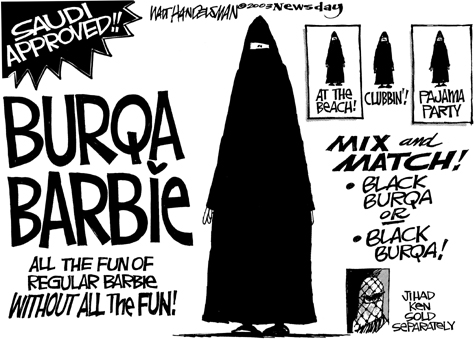
Militant Islam Monitor > Satire > From bust to abaya and beer to a beard: Barbie and Homer SImpson convert to Islam
From bust to abaya and beer to a beard: Barbie and Homer SImpson convert to Islam
October 30, 2005
|
Barbie Meets her Muslim Match | |
|
http://www.theglobeandmail.com/servlet/ArticleNews/TPStory/LAC/20051027/BARBIE27/TPInternational/Africa ------------------------------ MIM: The article failed to mention the "Bomber Barbie' which is already available:
MIM: In the Islamo facist weltaanschauaang American 'sex symbols' like Barbie and the Homer Simpson type 'everyman' submit to Islam and become shar'ia compliant . Omar Simpson? No beer for Arab version of Homer
http://www.twincities.com/mld/twincities/entertainment/television/12962772.htm DUBAI, United Arab Emirates — When an Arab satellite TV network, MBC, decided to introduce "The Simpsons" to the Middle East, they knew the family would have to make some fundamental lifestyle changes. Omar Shamshoon, as he is called on the show, looks like the same Homer Simpson, but he has given up beer and bacon, which are both against Islam, and he no longer hangs out at "seedy bars with bums and lowlifes." In Arabia, Homer's beer is soda, his hot dogs are barbecued Egyptian beef sau-sages and the doughnut-shaped snacks he gobbles are the traditional Arab cookies called kahk. An Arabized "Simpsons" — called "Al Shamshoon" — made its debut in the Arab world earlier this month, in time for Ramadan, a time of high TV viewership. It uses the original "Simpsons" animation, but the voices are dubbed into Arabic, and the scripts have been adapted to make the show more accessible, and acceptable, to Arab audiences. The family remains, as the producers describe it, "dysfunctional." They still live in Springfield, and "Omar" is still lazy and works at the local nuclear power plant. Bart (now called "Badr") is constantly cheeky to his parents and teachers and is always in trouble. Providing the characters' voices are several popular Egyptian actors, including Mohamed Heneidy, considered the Robert De Niro of the Middle East. MBC hopes "Al Shamshoon" will be the first of many adaptations for the growing Arab TV audience. "We are opening up a whole new genre of programming in the Middle East," says Michel Costandi, MBC's business-development director. Suppliers of Arabic-dubbed Western cartoons say demand had been sky-high for years, with Walt Disney Co. dubbing countless animations. Now, broadcasters are looking for something new. "The advent of the satellite era in the Arab world has created — and is still creating — new channels on a continuous basis," says Sherine El-Hakim, head of Arabic content at VSI Ltd., a London-based company that dubs and subtitles TV shows and other content for broadcasters and corporations. With 60 percent of the population in the Arab world under the age of 20 — 40 percent is under age 15 — the market for Arabized animations is vast. "Arabization is going to boom in these next few years," says El-Hakim. "We're such an impressionable people, and we aspire so much to be like the West, that we take on anything that we believe is a symbol or a manifestation of Western culture." "Pokemon," "Digimon" and other animated shows from Japan were popular first, she says, "but now the Americans are taking over." "Al Shamshoon" is currently broadcast daily during an early-evening prime-time slot, starting with the show's first season. If it is a hit, MBC envisions Arabizing the other 16 seasons. But there's no guarantee of success. Many Arab blogs and Internet chat sessions have become consumed with how unfunny "Al Shamshoon" is. "They've ruined it! Oh yes they have, sob. … Why? Why, why oh why?!!!!" wrote a blogger, "Noors," from Oman. Some longtime "Simpsons" fans who are Arabs are incensed over the Arabized version. "This is just beyond the pale," wrote As'ad AbuKhalil, a professor at California State University, Stanislaus, whose blog, angryarab blogspot, often touches on politics and the media. After viewing a promotional segment of "Al Shamshoon," AbuKhalil wrote, "It was just painful. … The guy who played Homer Simpson was one of the most unfunny people I ever watched. Just drop the project and air reruns of Tony Danza's show instead." Few shows have more obsessed fans than "The Simpsons," and their vast online community is worried about whether classic Simpsons dialogue can even be translated. One blogger wrote, " 'Hi-diddly-ho, neighbors!' How the h—- are they going to translate that? Or this great quote: Mr. Burns: 'Oooh, so Mother Nature needs a favor?! Well, maybe she should have thought of that when she was besetting us with droughts and floods and poison monkeys! Nature started the fight for survival, and now she wants to quit because she's losing. Well I say, hard cheese.' " A blogger, who uses the name "Nibaq," wrote, "I am sure the effort (of) the people who made this show to translate it to Arabic could have made a good original show about an Egyptian family living in Egypt, dealing with religion, life and work and trying to keep a family together. That way they can proudly say Made in Egypt, instead of Made in USA, Assembled in Egypt." El-Hakim says when it comes to Arabized animation, the market is still in its experimentation phase. A few boom years for adaptations of U.S. content |




